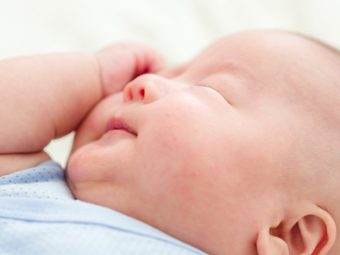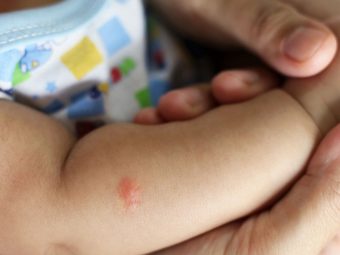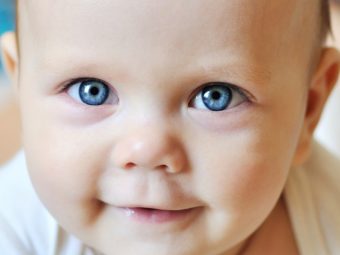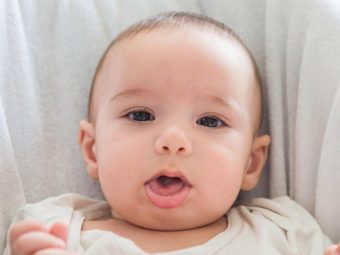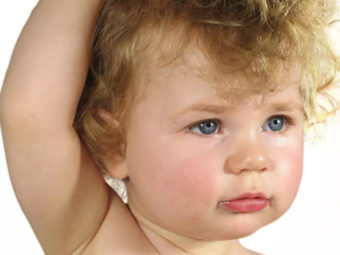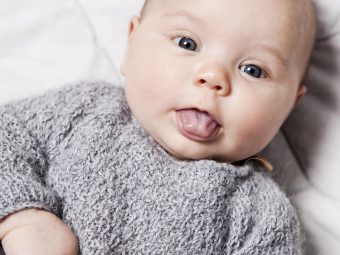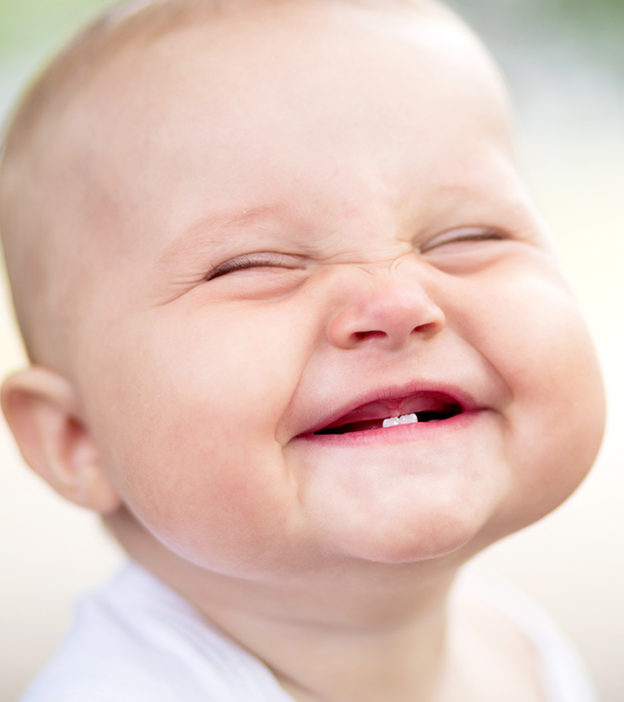
Image: iStock
Babies start to smile from the time even before they are born. Yes, you read that right.During the 11th week of pregnancy, your baby can smile and make complex facial expressions while still in the womb(1). These smiles, known as reflex smiles, may continue for a few weeks after birth as well. But from when do babies smile after birth?
Read on to know about when babies start to smile, ways in which you may encourage them to smile, and what smiling says about your baby’s development.
When Do Babies Smile?
Image: Shutterstock
Babies begin to give a reflex smile from almost when they are born.Reflex smiles are smiles triggered by certain stimuli or events. You may notice a smiling reflex when the baby relieves in the diaper, or you may notice thebaby smiling in their sleep(2).
A baby progresses to a happy social smile at around the age of two months (3) (4). A social smile is a true smile that the baby shows in response to a parent’s voice or smile.By four months of age, babies use social smiles often to engage and gain the attention of those around them(5). It is not uncommon for a four-month-old to spontaneously smile at people around them for interaction.
 Did you know?
Did you know?How To Encourage Your Baby To Smile?
Image: Shutterstock
The simple, playful moments you share with your baby are often sufficient toencourage them to smile. You may try the following activities to achieve your baby’s first smile and have them smile often.
- Talking to them in baby language
- Smiling at them
- Playing peek-a-boo or making funny animal sounds
- Maintaining eye contact while talking
- Enacting what you speak
- Laughing with them
- Making funny voices or faces
What Does A Baby’s Smile Say About Their Development?
A research study suggests that the grinning and smiling of a baby may help understand their emotional development and social skills(6). Research notes that babies may smile when they observe certain actions or events they perceive as humorous, even if no one around is smiling. Understanding your baby’s social cues is an essential part of parenting. Infant smiling may suggest healthy cognitive andsocial development, indicating the baby’s brain can detect humor or develop amusement independent of their parents’ reaction.
 Did you know?
Did you know?It has also been shown that infantile smiling helps release certain hormones in a baby’s body that aid in theirbrain developmentand overall development (7). In addition, receiving smiles and giving them back in return may become the stepping stones for your little one to learn how to be social, bond with others, and have good relationships.
What To Do If The Baby Isn’t Smiling?
Image: Shutterstock
Early childhood is a vital time for baby developmental stages such as physical and emotional development including baby facial expression. If your little one is not smiling or showing signs of early grins or changes in facial expression by the end of two months of age, it does not necessarily mean that there is some problem.
The rate at which babies hit various developmental baby milestones may vary from one baby to another. Preterm babies develop according to theirgestational age. So a smile may be naturally delayed in them. Even in full-term babies, each child doesn’t develop a social smile at exactly the same age. If your baby does not show any signs of smiling even in their third month, it is advised to consult a pediatrician. Even that may not indicate a problem with your child’s development, but then, the doctor is the best judge.
常见问题
1. Can babies smile at four weeks old?
Babies usually start giving social smiles during early infancy, when they are around two months old. But a newborn may show signs of reflex smiles since birth (8).
2. At what age do babies coo?
Your baby will start cooing and making similar sounds (such as ooh-ooh-ooh, ah-ah-ah) by the time they are two months old (9).
A smiling baby is a sight for sore eyes and an exciting moment for parents. Your baby smiling back at you means that they are acknowledging your presence and expressing their joy of seeing you. It also means that they are starting to become conscious of their emotions. You may try various activities to engage your baby and make them smile often. If you have any concerns about your baby’s achievement of this smiling milestone, do not hesitate to discuss it with a pediatrician.
Infographic: Effective Ways To Encourage Babies To Smile
宝宝的微笑是一种最宝贵的薄gs in your life, but sometimes it can be challenging to get them to smile. The following infographic presents practical tips to encourage your baby to smile. So start implementing these techniques and cherish your adorable baby’s cute smiles!

Illustration: Momjunction Design Team
Get high-quality PDF version by clicking below.
Download Infographic
Key Pointers
- Babies start smiling during the 11th week of pregnancy while in the mother’s womb.
- After birth, an infant usually begins smiling socially between two to three months.
- The smiles in babies are triggered by external stimuli to express their emotions and feelings.
- Smiling in babies indicates their social and cognitive development.
- Peek-a-boo, enacting actions, talking in baby language, and other fun activities can encourage babies to smile often.
References:
- Baby development.
https://www.choicespregnancy.org/sexual-health/pregnancy-education/baby-development/ - Parents’ Guide to Understanding Baby’s Smile.
https://pathways.org/watch/parents-guide-to-understanding-babys-smile/ - Developmental Milestones.
https://depts.washington.edu/dbpeds/Screening%20Tools/Devt%20Milestones%20Table%20(B-6y)%20PIR%20(Jan2016).msg.pdf - Milestone Moments.
https://www.cdc.gov/ncbddd/actearly/pdf/parents_pdfs/milestonemomentseng508.pdf - Emotional and Social development. Ages 1 to 12 months.
https://www.uofmhealth.org/health-library/ue5463 - What Your Baby’s Smile Can Tell You About Her Development.
https://www.psychologicalscience.org/news/what-your-babys-smile-can-tell-you-about-her-development.html - What’s in a smile.
https://raisingchildren.net.au/babies/connecting-communicating/bonding/whats-in-a-smile - When do babies first smile?
https://www.healthychildren.org/English/tips-tools/ask-the-pediatrician/Pages/When-do-babies-first-smile.aspx - Hearing & Making Sounds: Your Baby’s Milestones.
https://www.healthychildren.org/English/ages-stages/baby/Pages/Hearing-and-Making-Sounds.aspx - Sanae Mizugaki et al., (2015); The Power of an Infant’s Smile: Maternal Physiological Responses to Infant Emotional Expressions.
https://www.ncbi.nlm.nih.gov/pmc/articles/PMC4465828/ - Paul Ruvolo et al., (2015); Infants Time Their Smiles to Make Their Moms Smile.
https://www.ncbi.nlm.nih.gov/pmc/articles/PMC4580458/









